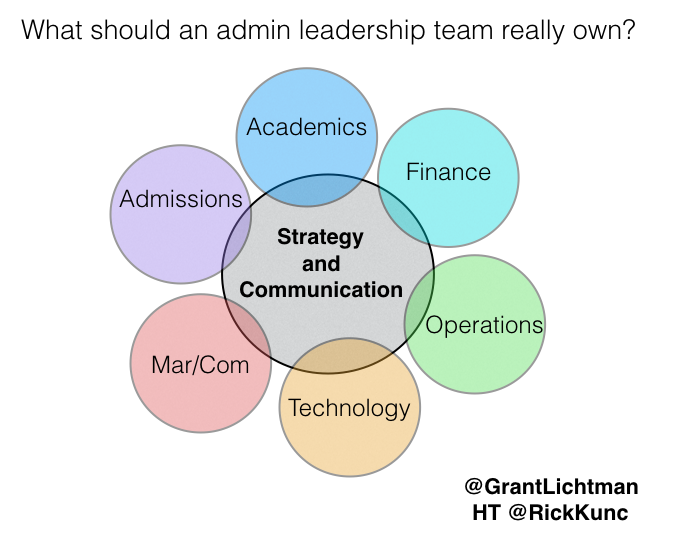“What classroom (pedagogical) practices have no place in today’s classroom?” This was a question T. J. Locke, the ever-thoughtful Head of School at Episcopal Academy just outside of Philadelphia, posed a few days ago to a list of colleagues. He is going to compile the results, but I thought I would share my quick brain dump to this really provocative prompt. Are these all elements of pedagogy? Maybe some purists would argue that some are not. But I thought about what I look for when I am asked to observe a classroom and comment on “what has changed and what has stayed the same?” My list contains few absolutes; as T.J. said in his email to us, “I can probably even find a reason to use a Scantron”. My list is more of a “re-balancing” than a “get rid of” list:
- Teachers asking more questions than students
- Teachers using the same course outline for many years in a row
- Teachers lecturing for large parts of their allotted time
- Teachers always leading discussions rather than asking students to lead
- Teachers teaching the same subject or sub-subject year after year (lacks growth)
- Teachers selecting themes or directions of focus without engaging students in the selection.
- Courses built around short periods of time
- Courses built around single, isolated subjects
- Students sitting for most of a class period
- Students sitting in the same place every day
- Furniture that never or rarely moves
- Projects/papers that meet requirements in only one subject course
- Students answering questions one at a time, directed at the teacher
- Students working primarily on their own rather than in groups
- Students working primarily at their desks rather than in groups, on walls, in hallways, or in other spaces.
- Walls covered with posters and “stuff” when they could be used as active, visible working spaces.
- Storing lots of things in the classroom that rarely get touched or used.
- Textbooks (often out of date) as primary source material
- Camping in the classroom when many other learning opportunities lie just outside or beyond.
- Pop quizzes
- Curriculum with largely predictable outcomes and answers
- Largely consumption; rarely creation
- Failing to use recent brain research in how we learn
- Failing to use community resources in the classroom and in the curriculum
- Failing to incorporate simple elements of mindfulness into class routines
- Lack of flexibility in the student-teacher classroom ratio
- Reliance on large quantities of homework
What is on your list? Do you think about these elements of your teaching practice? Are you open to opportunities to change your practice if it leads to greater student engagement in learning? If you add your list in the comments section I will pass them on to T.J. for his compilation.




Grant,
Here is what I sent T.J.:
“Not sure this is what you mean, but I’ll offer this. We shouldn’t be spending time in classrooms on anything that is rather mechanical and can be better accomplished very technology because of how it would provide instant feedback and allow kids to proceed at own rate. Some examples that pop into my mind are keyboarding, basic math facts, basic spelling, parts of vocabulary study. I’m sure there are others.”
Looking fwd to seeing what TJ puts together and I will add any comments I get. This was a great question, and an easy one for teachers to think about in terms of their own practices.
Teacher answering all the students questions
Students not feeling known.
Starting the year or beginning of a course (as we have this week) with “This is what you will be assessed on and listing the standards” Heck! We haven’t even met the students yet and don’t know what they know already, where their strengths lie or what their passions, or areas of interest are and what they want to learn.
I was asked my my department head, “What will I be assessing this year?” My response was ” I’ll be teaching x, y and z based on what the students need to learn and that I will determine what they are assessed on and when as the year unfolds”. Hopefully the message is getting through……..
“Dates for assessment are……. ”
Not quite classroom pedagogy but the underpinnings of I guess and immediately setting up an environment that is about testing and getting grades rather than rich learning.
A lesson or unit plan that is set in stone
Teachers “leaving” at 3:30
Summer as time off
Recess and play as “down time” and class as “up time”
Learning the foundational basics before moving to open-ended investigations
Administrative structures resembling traditional flow charts
Grades
Others I am thinking about, but I yearn for a dialogue because I see some developmental, social/emotional, or resources value to them:
Grade configurations based on age
Division breakdowns: preschool, lower, middle, upper
Designated spaces in buildings-science labs, art rooms, etc.
Changing the classroom practices to make parents happy when what they want is the status quo or worse… what school looked like in their homeland. We overlook the parent part of this too often. Many want grades, competition, piles of homework, etc. They equate busy, silent children as learning. We have a long way to go on this one.
Creating classrooms that make students “ready” for the next level. Nobody knows what that means! Want to provoke a group of teachers, just ask them, “What does high school ready mean?”